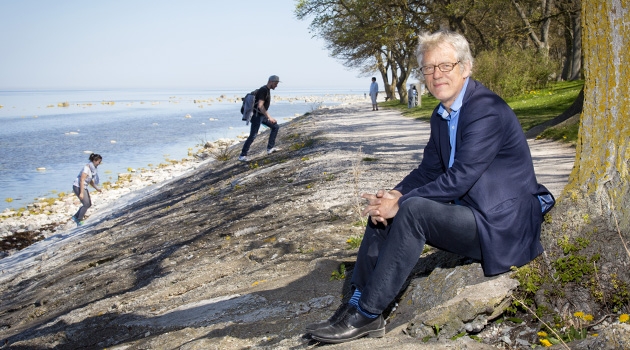Small places can have big voices on sustainability issues
Hello Owe Ronström, organiser of four seminars on sustainability at Almedalen together with Swaminathan Ramanathan. The panelists include guests from both Sweden and India. How did this come about?
“This is the third year of a project looking to broaden and expand the collaboration between Sweden and India. We chose India because we have an ongoing project with Swaminathan Ramanathan, an Indian researcher who lives here on Gotland.”
What will you be discussing?
“The theme is sustainability issues. We want to highlight that one of the world’s most populous nations is able to collaborate with a place like Gotland with 60,000 inhabitants, and that it can do so very successfully. The area of sustainability is usually tackled at a national level as this is how the world is structured, but it’s also important for voices from places like Visby and Gotland to come into contact and collaborate directly with people from other places, without having to go via national systems. An important lesson we want to convey is that small places can have big voices in the context of sustainability.
“Gotland has managed water projects with Indian participants, and Swedes have also taken part in projects in India. We can circumvent some of the national considerations as we are so obviously not national players. One of the key terms in the panel discussions is ‘connect and collect’, as we want to connect and collect experiences and see them being taken in different directions.”
You spoke about having projects with India, can you tell us a bit more about them?
“We mediate and offer solutions but have not been involved in the physical projects. One exciting project is looking at water supply, where experiences from pilot projects in Indian villages have been used to test implementation here and vice versa. There are also projects involving food supply. In India farmers have been given the opportunity to cultivate a third crop, even though it is most common to only have two. That third crop is solar energy. Farmers have been equipped with solar cells, which has enabled them to produce energy alongside their crops.”
What do you hope to get out of participating in Almedalen Week?
“We want to find out what expertise is available that we don’t yet know about and then help transfer it onwards. Connect and transfer – that’s what we want to do.
“As a researcher I have been taught to describe what I study in neutral terms. That is a reactive approach that is no longer suitable when it comes to sustainability. We must become more proactive and use the expertise we have to contribute to the areas we study. Taking part in Almedalen Week is one small step in that direction.”
Sandra Gunnarsson
Seminars
Seminar 1 – Rejuvenating the planet: How can Sweden and India collaborate for a sustainable future?
Time: Monday, 4 July, 12:00-13:00
Venue: Uppsala University Campus Gotland More details:
Seminar 2 – What are the pathways to energy transition for climate neutrality for Sweden and India?
Time: Tuesday, 5 July, 12:00-13:00
Venue: Torget, Hus D, Uppsala University Campus Gotland
Seminar 3 – How can technology collaborations help us build a more sustainable planet?
Time: Wednesday, 6 July 14:00-15:00
Venue: B51, Uppsala University Campus Gotland
Seminar 4 – Partnerships towards Global Goals - Can Sweden and India show the way?
Time: Wednesday, 6 July, 15:30-16:30
Venue: Location: B51, Uppsala University Campus Gotland
Find out more
Seminar 1 – Rejuvenating the planet: How can Sweden and India collaborate for a sustainable future?
Seminar 2 – What are the pathways to energy transition for climate neutrality for Sweden and India?
Seminar 3 – How can technology collaborations help us build a more sustainable planet?
Seminar 4 – Partnerships towards Global Goals - Can Sweden and India show the way?

